Sara Hurtado and Kirill Khaliavin: "We are challenging ourselves not to play it safe"
November 1, 2018
By Reut Golinsky
Photo © Mireille Geurts, Reut Golinsky
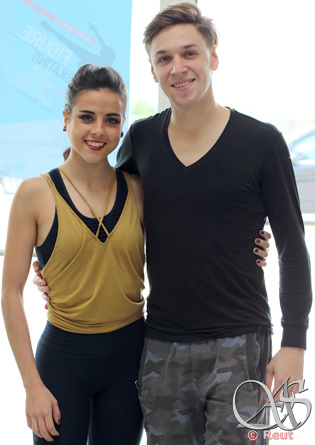 I have followed Sara Hurtado's journey since her first steps in senior competitions, and I was always charmed by her passionate personality. A few months after she made a drastic change in her life and moved to train with Kirill Khaliavin, we had a long talk about new beginnings. Two years later, during the Lombardia Trophy, I got a chance to talk to both of them together. We discussed a lot of things, from their Olympic memories to the goals they set for themselves following that experience, from the strong message they want to deliver in their free dance to the must visit places in Moscow and Madrid.
I have followed Sara Hurtado's journey since her first steps in senior competitions, and I was always charmed by her passionate personality. A few months after she made a drastic change in her life and moved to train with Kirill Khaliavin, we had a long talk about new beginnings. Two years later, during the Lombardia Trophy, I got a chance to talk to both of them together. We discussed a lot of things, from their Olympic memories to the goals they set for themselves following that experience, from the strong message they want to deliver in their free dance to the must visit places in Moscow and Madrid.
Let's start with the Olympic Games, because it was such a big thing for you to get there. Tell me, how did it feel, what was it like with Team Spain, what did you love the most, and whether you watched other sports.
Sara: Getting there was a roller coaster, but once we were there suddenly the feeling was that everything goes as it should. You go through such hard times then you find yourself there and you say: "This is what I worked for!" It was like a prize for us. Everything was so exciting, so amazing! During those 15 days, we improved so much just from being surrounded by such a great group of skaters. The whole event was really cool. We didn't have time to watch other sports, only figure skating. And watching Javi winning the medal... he (points to Kirill) was laughing at me because I was crying like a baby (laughs). And we had to practice afterwards! At first, I didn't know if I wanted to watch, because I usually get too much involved, I get very nervous, I thought I was going be dead for the rest of the day. And you know anything could happen, all the men were so tough, everyone was so at the top of their game. And then he won and made me cry!
Kirill: Well, I was pretty sure Javi would get that medal. So I was calmer.
Kirill, these were your first Games. Were they like you expected them to be?
Kirill: The competition itself, the ice dance competition was pretty much like I expected. 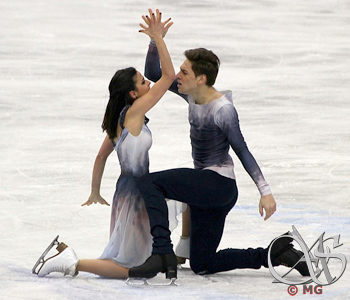 Almost all of the best ice dance couples were there and you can compare yourself to them, to see what you have to improve, to understand that there are things that you maybe even do better than they do. It gives you satisfaction about the work you have done. You don't look like a small kid competing with adults, you're equal, this is your place. And that moment when you skate well - during the practices and at the competition - you see that you're doing everything right, that you're on the right track, and it brings you the satisfaction.
Almost all of the best ice dance couples were there and you can compare yourself to them, to see what you have to improve, to understand that there are things that you maybe even do better than they do. It gives you satisfaction about the work you have done. You don't look like a small kid competing with adults, you're equal, this is your place. And that moment when you skate well - during the practices and at the competition - you see that you're doing everything right, that you're on the right track, and it brings you the satisfaction.
Sara: It is reassuring...
Kirill: And the audience was great!
Sara: It was fun, because Russian fans were cheering for him. And there were also a lot of Spanish flags, my parents were there too. My dad does this very specific sound when he cheers on us and he is so loud, you can actually hear it on the video, and that's my dad!
Apart from the competition was there something exciting? The opening ceremony maybe?
Sara: Walking behind the Spanish flag...
Kirill: Yes, the opening ceremony was cool. Unfortunately we didn't see that much, only after that on TV.
Sara: Also, it was super cold! So we waited until the flame was lit, we saw Yuna skating up there and then we had to leave.
Kirill: As for the other sports... We saw a little bit of short track. But we didn't watch anything else because we checked the schedule of the buses, we would've spent the whole day just to get there [to the other cluster] to watch the competition and come back. Unfortunately, we couldn't afford that.
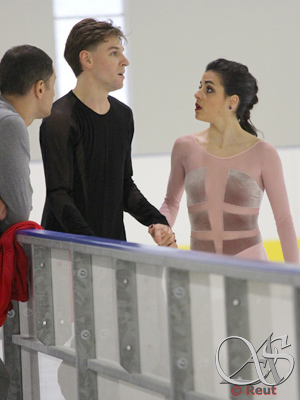 Maybe any other places in your coastal cluster?
Maybe any other places in your coastal cluster?
Sara: I was in the Czech house; it was the closest to the village.
Kirill: I really liked the game rooms inside the village. Everybody could come and play table tennis or pool, watch the competition together, sharing this experience with other athletes, it was nice. And also you could relax, get the massages.
Sara: Yes, and you could meet all the other athletes from other countries. And everyone would ask for a pin, because we were one of those "exotic" countries at the Winter Games, but we only had ten pins! This is all that our Olympic committee gave us, this is all they had.
You said to be there felt like a prize for all the hard work. Did it give you new motivation to work even harder to be there again in four years?
Sara: I think it was a good basis to build on; it was a huge event to put yourself on the skating map and in the skating world. Having this experience of the Games gives you a lot of confidence and security to do another Olympic cycle. But in four years anything can happen so honestly for us it's easier to take it one season at a time. We want to work, to improve, we focus on our programs this season to bring them to the highest level that we can get to and then we'll see which results we get.
This is going to be your third season together. For your first season your goal, as I see it, was to find your connection, your togetherness. For your second season your main goal was, obviously, to qualify for the Olympic Games. This season what would your main goal be?
Sara: At the beginning everything went so fast, we had to perform well so quickly that we had to get to know each other really fast. Three months after we started skating together we were already competing, and we have been learning a lot through competitions and being in such a tough environment. It was a big challenge for us but at the same time it really pushed us to know each other much better and trust each other, knowing that we are there for the same reasons and for the same goal.
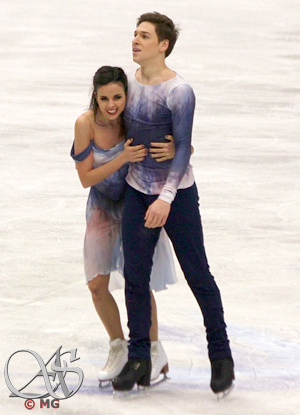 Now it feels much better because even though we want to keep growing and achieving even higher results, it doesn't seem as rushed. Last season I spent nearly a month off the ice, I tore my adductor, three centimeters, it was very deep. Thankfully, this summer we didn't have any accidents so we were able to plan the season without haste. But we are very ambitious people so we never set lower standards, we always want more.
Now it feels much better because even though we want to keep growing and achieving even higher results, it doesn't seem as rushed. Last season I spent nearly a month off the ice, I tore my adductor, three centimeters, it was very deep. Thankfully, this summer we didn't have any accidents so we were able to plan the season without haste. But we are very ambitious people so we never set lower standards, we always want more.
Last season you exceeded my expectations, I don't know about yours (both smile) - 8th at the Europeans, 12th at the Olympics. So if you say you're ambitious and want more, what does it mean?
Kirill: We want to get closer to the best ice dance couples. For example, at the Olympics we had scores close to couples in the second warm up group, 4-5 points only behind them. So we want to get closer, to show that we're strong and can be even higher, skate even better.
Sara: This season we already have two Grand Prix events, so that's a good opportunity to perform and prove ourselves, to show that we belong to the top teams.
Are there any specific things that you know you should work on more?
Sara: Oh, there is a long list! (laughs) We're still a new team, we are learning a lot from each other. We are really challenging ourselves to create new things, to find our own personality and not to play it safe. Through that process we are also working on our skills and our partnership. All is still new, many of those teams have been skating together for ten years or more, so all that process is already in their muscle memory and we are still going through that. Kirill is very nice and very refreshing; I know that every day I'm going to learn something new from him.
I don't really know you well, but my impression from you is that you're very different, I guess two years ago it was like two polarities trying to work together. Now, two years later, do you feel that you influenced each other, changed each other a bit?
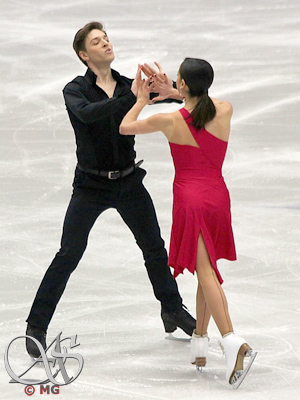 Kirill: You know, I didn't notice anything like that. It works for us, so I try not to analyze too deep. Also, it's a process, it's not like something wasn't there and suddenly is, didn't work and suddenly works. If we improve as a couple, it means this collaboration works. There are a lot of small things, going over them we're getting better as a couple.
Kirill: You know, I didn't notice anything like that. It works for us, so I try not to analyze too deep. Also, it's a process, it's not like something wasn't there and suddenly is, didn't work and suddenly works. If we improve as a couple, it means this collaboration works. There are a lot of small things, going over them we're getting better as a couple.
Sara: In a way, we balance each other. I got a lot of things from Kirill that help me to deal with pressure. We have different personalities and, for example, before going on the ice I talk much more. But after the competitions we spent together I can feel what Kirill needs, so I don't interfere with that and I think he knows what I need, too. We know better now what we need so that when the music starts we're 100% ready. All this is part of the process. Yes, we influence each other in various things because we put our personalities to the team but I don't think we've changed each other. What makes it work is an empathy that you get being in a small team of two people.
You mentioned before that you try to find new directions and not to play it safe. You also invite people outside of your regular team. Last season you worked with Antonio Najarro, this season you asked Iker Karrera to work with you. How and why did you choose him?
Sara: Maybe because I am his fan? (laughs) Well, we were thinking about the free dance theme for this season and we didn't want to do something similar to "Don Quixote" (their FD from last season) or to take some story that has already been done, stories which already have this predefined image in public's consciousness, all those kind of stories like "Romeo and Juliet", when you know what to expect. We wanted to go far from such musical pieces and do something of our own. So I showed Kirill some videos and asked what he thinks about this style of movements.
Kirill: And I liked it and said: let's try!
Sara: First, I just sent Iker a message on Instagram and I thought he will never read it.
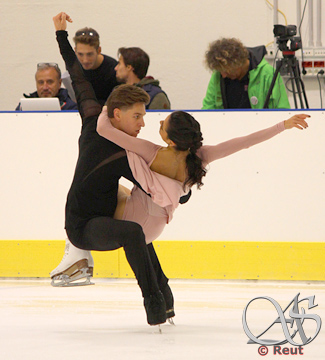 Is he very famous in Spain?
Is he very famous in Spain?
Sara: Not very famous but he is really good and he is now one of the coaches of the TV show "Fame" which is similar to "So You Think You Can Dance", a reality show with professional dancers, they put them together into a house and train them. He was super busy with that program when I wrote him. So I thought: "I don't know if this is going to work but let's try." And then he answered: "Yes, absolutely, I never worked with the figure skaters but I think it's such a cool experience, so if you guys want it I will be so glad to help you!" Next challenge was to find the date, because of course, he's busy, we are busy, we have to go to Madrid. But everything worked out, the week that we were in Spain he was free and we were able to get some ice time in Madrid.
We started with things off the ice, of course. So he listened to the music and understood the movement. Then we put it on the ice and he was super excited about how the speed changes everything. It inspired him and he better understood how to adjust the movements. It was super cool for us too. He never worked with the ice dancers, doesn't know what hold or killian is, but he has this fresh perspective, so we ended up doing things that we never thought about.
So the idea and the music were yours?
Sara: Yes, we found the music that we liked and we already had all the elements ready, the main layout was done. And then he put details here and there in between. We had the idea of the storyline and then he built on that.
Indeed when I saw you practicing this dance just now, I wondered what is the story behind it.
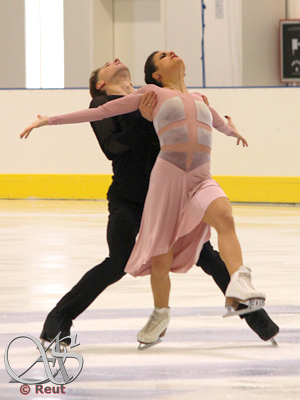 Sara: This program is about how these days we all repeat the same mistakes and never learn from them. And it's not only about the big mistakes and craziness that is going on in the world but also about every person, about us. "...We never learn, we've been here before..." (quote from Harry Styles' "Sign of times" song they are using in their free dance -ed). This program is our way to say: "Let's look at the past, let's learn from it and let's be hopeful and build for a better future". Also, because we show this partnership of a boy and a girl helping each other and saying: "Hey, let's find out a way for making each other better and grow more".
Sara: This program is about how these days we all repeat the same mistakes and never learn from them. And it's not only about the big mistakes and craziness that is going on in the world but also about every person, about us. "...We never learn, we've been here before..." (quote from Harry Styles' "Sign of times" song they are using in their free dance -ed). This program is our way to say: "Let's look at the past, let's learn from it and let's be hopeful and build for a better future". Also, because we show this partnership of a boy and a girl helping each other and saying: "Hey, let's find out a way for making each other better and grow more".
That's interesting. The music itself is rather melancholic and sad, and so, not knowing the story, I wondered why such a cheerful and energetic couple would skate to it, but with the way you explain it it is sad but also hopeful.
Sara: It is not sad, maybe more reflective. And it doesn't have this: "Wow, there is no way to get out of this". It is more like: "We know the world is messed up but what we can do about it is to put ourselves out there and be there for each other".
If we talk about people who help you, Ksenia, Kirill's wife, is now coaching so you basically have an "in-house" specialist, I wondered if she is helping you too from time to time.
Kirill: When she sees us skating, she gives us some advice. And we ask her what we could do better. But usually she just watches the competitions and after that she proposes her opinion. This season she saw us only once, she saw our free dance and she liked it, but it was about a month ago; let's see what she will say after this competition. (smiles) We have our coaches, they see us every day. And there are various specialists who come and give their opinion, 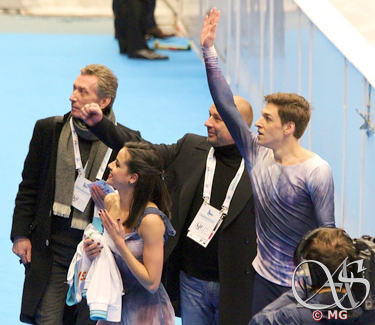 Ksusha, of course, is always welcome to come too.
Ksusha, of course, is always welcome to come too.
Sara: But Ksusha for us is more like family. She will always give her opinion, of course, but as family. She has the knowledge so she can give a more professional opinion and she can comment on certain things that non skating people don't know but she doesn't act as a coach.
Kirill: She is mostly supportive, cheering for us.
Kirill, you mentioned that it was actually her idea for you to skate with Sara. Is she glad about it now?
Kirill: Of course!
Sara: (jokingly makes a sound and a gesture of relief) I wish she could've come to Pyeongchang, but everything went so fast and of course she had to work and it was so expensive to make it. But it would have been awesome to have her there...
OK, the last question, not related to the figure skating. Sara, you've lived in Moscow for two years already, is there some specific place that you love and would advise everyone to visit? And you, Kirill, visited Madrid a lot, so think about one or two places which are "must see" there.
Sara: I really like walking from the Red Square down, crossing the river and going towards the 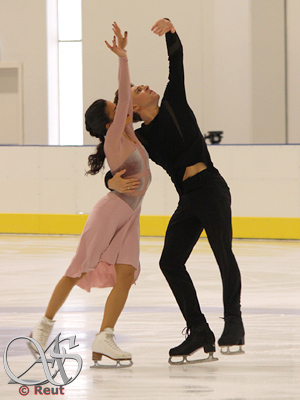 Cathedral of Christ the Savior that I find completely amazing, this white huge - so huge! - building with the golden top, and you cross the river and you see also the statue of Tsar Peter the Great. And everything is colossal.
Cathedral of Christ the Savior that I find completely amazing, this white huge - so huge! - building with the golden top, and you cross the river and you see also the statue of Tsar Peter the Great. And everything is colossal.
Kirill: I guess, it's Bolotnaya quay.
Sara: Yes! And then you go to the right and you enter the park... I really love this walk. All tourists always know to go to the Red Square, yes, it's amazing, but I think that part I love the most. And then you can go the other way and see the White House... Also, the Moscow City. And with the sunset you have all the reflections on the river...
Sounds like a nice walk indeed! And what about Madrid, Kirill?
Kirill: Every time I visit Madrid, I always visit El Retiro, it's a big park. It's not an amusement park, but there is a little pond there, also there is this little area for the cats.
Sara: There used to be a zoo in the park. It used to be a royal park, and the king had a zoo there, but now there are only peacocks.
Kirill: Of course, Gran Via is must see too. And another place in Madrid I love is a tapas bar, close to Plaza Mayor, beer and tapas with calamari, the simplest one you can choose is very tasty; the interior is very nice too, very simple but nice. It is quite crowded, but most of the visitors are local. And the San Miguel Market just nearby, they have the best jamón ("ham" in Spanish), a bit expensive but they have a lot of different types.
Sara: You have there meat, and fruits, and oysters. It has everything you can imagine in this rather small place surrounded by old buildings. Kirill also knows all the museums! He's been to more museums than me.
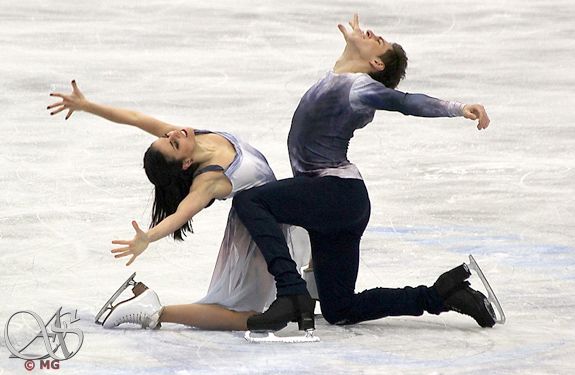
Sara and Kirill finished their first event of the season with the bronze. And now they are heading to two Grand Prix events - in Helsinki and in Moscow. We're wishing them a fruitful season, a season of growth and fulfillment.



